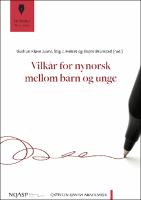Vilkår for nynorsk mellom barn og unge
| dc.contributor.editor | Kløve Juuhl, Gudrun | |
| dc.contributor.editor | Helset, Stig J. | |
| dc.contributor.editor | Brunstad, Endre | |
| dc.date.accessioned | 2020-11-09T14:11:36Z | |
| dc.date.available | 2020-11-09T14:11:36Z | |
| dc.date.issued | 2020 | |
| dc.identifier | OCN: 1253412226 | |
| dc.identifier.isbn | 9788202693527 | en_US |
| dc.identifier.isbn | 9788202687052 | en_US |
| dc.identifier.isbn | 9788202694104 | en_US |
| dc.identifier.isbn | 9788202694111 | en_US |
| dc.identifier.uri | https://library.oapen.org/handle/20.500.12657/42885 | |
| dc.description.abstract | "Any scholarly conversation about literacy as a cultural phenomenon connected to specific written languages ought not overlook the issue of intergenerational transmission. That is, how and to what extent the written language is imparted to and further developed by ensuing generations. Yet research on Nynorsk has only recently taken this into consideration; 20 years ago, research on Nynorsk was primarily concerned with the language corpus and the language’s history. The present issue of Skriftkultur is thus part of an effort to establish intergenerational transmission as a subject area within Nynorsk research. This area involves not only questions regarding exposure to and instruction in Nynorsk within the context of the educational system, but also how young people themselves relate to the language and the role it plays in their lives. In a wider sense, the issue of transmission is also concerned with examining the places and functions the language is connected to, i.e., the social practices underlying the use of Nynorsk. In this issue, 13 researchers explore the circumstances surrounding use of Nynorsk by children and youth, from kindergarten to university and from a variety of perspectives. This publication will be of interest to students, researchers and others interested in children and youth’s use of lesser used languages. This anthology presents new research that elucidates domestic violence from more diverse perspectives. In the nine chapters, the contributors analyze how types and degrees of violence and abuse can vary depending upon the interplay between such different factors as class, ethnicity, gender and sexual orientation. An overarching theme is how we understand and talk about equality, difference and diversity. The book does not provide an exhaustive analysis of violence in today’s multi-cultural Norway, yet it is the first Norwegian book about domestic violence that has diversity as a primary them. The book will be of interest to researchers, students, employees in social services and support organizations and anyone concerned about domestic violence and abuse." | en_US |
| dc.language | Norwegian | en_US |
| dc.relation.ispartofseries | Skriftkultur | en_US |
| dc.subject.classification | thema EDItEUR::C Language and Linguistics | en_US |
| dc.subject.other | Nynorsk | en_US |
| dc.subject.other | child | en_US |
| dc.subject.other | youth | en_US |
| dc.subject.other | intergenerational transmission | en_US |
| dc.subject.other | skriftkultur | en_US |
| dc.subject.other | barn | en_US |
| dc.subject.other | unge | en_US |
| dc.title | Vilkår for nynorsk mellom barn og unge | en_US |
| dc.type | book | |
| oapen.abstract.otherlanguage | "Ein fagleg samtale om skriftkultur kjem ikkje unna spørsmålet om tradering – altså korleis og i kva grad skriftkulturar vert overført til nye generasjonar og utvikla av dei. Likevel har forskinga på nynorsk inntil relativt nyleg halde seg unna dette livsviktige spørsmålet for ein skriftkultur og eit språk. For tjue år sidan handla forskinga på nynorsk i stor grad om nynorsknorm eller språkhistorie. Dette nummeret av skriftserien Skriftkultur er ein del av etableringa av tradering av nynorsk som eit forskingsfelt. Forskingsfeltet inkluderer spørsmål knytt til eksponering for og opplæring i nynorsk i utdanningsinstitusjonen, men også spørsmål om korleis barn og unge sjølve stiller seg til nynorsk og kva plass språket har i livet deira. I eit vidare perspektiv handlar spørsmålet om tradering av nynorsk også om kva plass og funksjonar språket fyller, dvs. kva slags sosial praksis som ligg til grunn for nynorsken. I dette nummeret undersøkjer 13 forskarar vilkåra for nynorsk mellom barn og unge frå ulike vinklar og på ulike tidspunkt i livet, frå barnehage til studentliv. Publikasjonen rettar seg mot studentar, forskarar og andre som er opptekne av dette viktige forskingsfeltet. " | en_US |
| oapen.identifier.doi | https://doi.org/10.23865/noasp.106 | en_US |
| oapen.relation.isPublishedBy | bf7b42a4-6892-42e3-aaf8-8f32c8470a8b | en_US |
| oapen.series.number | 2 | en_US |
| oapen.pages | 307 | en_US |
| oapen.place.publication | Oslo | en_US |

